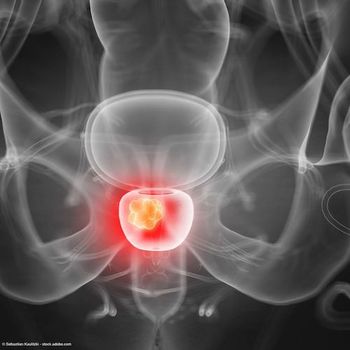
Antibody-drug conjugate ARX517 joins rapidly expanding PSMA pipeline
ARX517 is being explored in patients with prostate cancer and other PSMA-expressing solid tumors.
The first patient has been treated in a phase 1 study of the novel PSMA-targeted agent ARX517 in patients with prostate cancer and other PSMA-expressing solid tumors, according to Ambrx, the developer of the investigational antibody-drug conjugate (ADC).1
ARX517 joins a burgeoning PSMA pipeline that continues to expand as researchers aim to achieve similar success as
The ADC first demonstrated promise in preclinical models for prostate cancer when the pharmacokinetics (PK) and the toxicity profile were adequate in both enzalutamide (Xtandi)-sensitive and -resistant tumors. Now, the multicenter, open-label, dose-escalation phase 1 study (APEX-01; NCT04662580) will assess the safety, PK, and antitumor activity of the agent in patients with PSMA-expression prostate, pancreatic, lung, and ovarian cancers.
“I am excited to announce that we dosed our first patient in our phase 1 trial, and thus have taken the first steps in evaluating the potential clinical benefit of ARX517 in cancer patients with tumors overexpressing PSMA,” Feng Tian, PhD, chairman of the board, president, and chief executive officer of Ambrx, stated in a press release. “ARX517 is the second ADC in our internal pipeline to enter the clinic...”
APEX-01 will enroll approximately 76 patients who will be divided into 6 dose cohorts and evaluated in 2 parts. The doses of ARX517 in the study will range from 0.32 mg/kg to 2.0 mg/kg. At all dose levels evaluated, patients will receive treatment every 3 weeks by intravenous infusion. The number of patients included in part 2 of the study will not exceed 40, according to Ambrx.
Safety/tolerability is the key primary end point of the study in part 1 along with determining the maximum-tolerated dose of ARX517 and establishing the recommended phase 2 dose (RP2D). In part 2, the primary end point of the study is to further assess the safety and tolerability of ARX517 at the RP2D. PK and the presence of anti-drug antibodies from baseline, during treatment, and at follow-up are the secondary end points of the study. Investigators will also explore surrogate biomarkers during the study, including circulating tumor cells, PSA, and imaging.
The study is actively enrolling male patients aged 18 years or older with pathologically confirmed adenocarcinoma of the prostate and other solid tumors. All patients are required to have metastatic disease by computed typography, an ECOG performance status of 0 or 1 at screening, adequate organ function, a life expectancy of at least 6 months at screening and have discontinued any radiotherapy 4 weeks prior to the start of the study in order to be eligible for enrollment.
Patients with prostate cancer must meet all the overall inclusion requirements but also be on ongoing hormone therapy, be previously treated with an FDA-approved drug for the treatment of metastatic castration-resistant prostate cancer, have disease progression, and have discontinued any non-steroidal anti-androgens 4 weeks prior to joining APEX-01.
The first recruitment site for the first-in-human study of ARX517 in PSMA-expressing solid tumors is the Urology Cancer Center of the XCancer Research Network located in Omaha, Nebraska. The site study lead is Luke Nordquist, MD, FACP.
Reference
1. Ambrx announces first patient dosed in a phase 1 trial for ARX517, an ADC in development to treat PSMA expressing tumors. News release. August 3, 2021. Accessed August 3, 2021. https://bit.ly/3ChmDaH.
Newsletter
Stay current with the latest urology news and practice-changing insights — sign up now for the essential updates every urologist needs.






